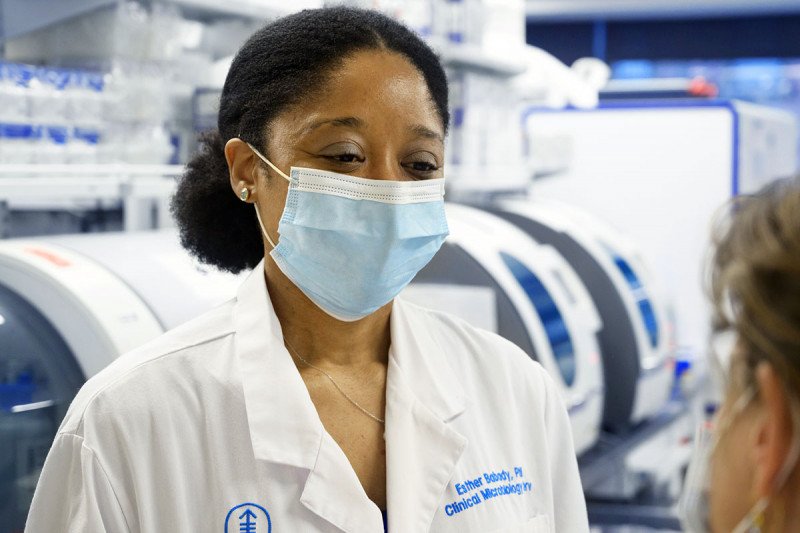
Patients with profound immunosuppression after undergoing hematopoietic stem-cell transplantation or receiving chimeric antigen receptor (CAR) T cell therapy may shed viable SARS-CoV-2 for at least two months, according to a retrospective study of 18 cancer patients treated at Memorial Sloan Kettering Cancer Center (MSK) and subsequently diagnosed with COVID-19 between March and April 2020. (1)
Our findings, published recently in a letter to the editor in the New England Journal of Medicine, indicate that the Centers for Disease Control and Prevention (CDC) may need to revise the current guidelines for COVID-19 isolation precautions for immunocompromised patients, which state that transmission-based precautions can be discontinued after at least 10 days and up to 20 days after the first positive viral diagnostic test. (2)
Detection of replication-competent SARS-CoV-2 is the most reliable indicator of contagiousness. (3)While much is known about the duration of live virus shedding in immunocompetent patients, little is known about how long immunocompromised patients are contagious. As a result, the current CDC guidelines on transmission-based precautions for immunocompromised patients are based on limited evidence. (2)
At MSK, we are dedicated to providing the best possible care while prioritizing patient safety and mitigating the spread of SARS-CoV-2. Since March 2020, our researchers and clinicians have been an essential part of the international response to the COVID-19 pandemic. We continue to share new developments for improving current practices in the academic literature and innovations through the MSK COVID-19 Innovation Hub during this unprecedented time.
Current CDC Guidelines for Discontinuing Transmission-Based Precautions
The CDC’s current guidelines state that transmission-based precautions may be discontinued for severely immunocompromisedpatients in hospital settings who were asymptomatic throughout their infection at least 10 days and up to 20 days following the date of their first positive viral diagnostic test. (2)
The guidelines acknowledge that the exact criteria that determine which patients will shed replication-competent virus for longer periods are unknown and that disease severity factors and the presence of immunocompromising conditions should be considered in determining the appropriate duration for select groups, such as at least 15 days of isolation for patients with severe COVID-19. (2)
Study Design
We used cell culture to detect viable virus in serially collected nasopharyngeal and sputum samples from 20 immunocompromised patients who were diagnosed with COVID-19 between March 10 and April 20, 2020. Eighteen patients had received hematopoietic stem-cell transplants or CAR T cell therapy, and two patients had lymphoma. (1)
COVID-19 was diagnosed with a modified CDC nucleic acid amplification test. We isolated live virus in the lab from nasopharyngeal and cultured specimens and identified genetic variants using whole-genome sequencing. Patient demographics, medical history, and clinical course of COVID-19 were extracted from medical records. (1)
Study Results
Among 20 patients in our study, 15 were receiving active treatment or chemotherapy. Eleven patients had severe COVID-19. In total, we analyzed 78 samples. We detected viral RNA for up to 78 days after the onset of symptoms (interquartile range, 24 to 64 days). We also found viable virus in 10 of 14 nasopharyngeal samples (71 percent), available from the first day of lab testing. (1)
Follow-up samples from five patients grew virus in culture over a period ranging from eight to 61 days after the onset of symptoms. Three patients with viable virus for more than 20 days had received allogeneic hematopoietic stem-cell transplants (2 patients) or CAR T cell therapy (one patient) within the previous three months, and they remained seronegative for antibodies to viral nucleoprotein. Two of these patients had severe COVID-19 and received investigational treatments. (1)
Whole-genome sequencing detected viral reads in all samples and yielded more than 95 percent complete SARS-CoV-2 genomes for 37 of 57 nasopharyngeal samples from 17 patients and all 18 cultured specimens. Serial sample genomes were obtained for 11 patients up to day 63 after the onset of symptoms. Results showed that each patient was infected with a distinct virus. Still, there were no changes in the consensus sequences of the original serial specimens or cultured isolates, consistent with persistent infection. (1)
Advancing Outcomes for Cancer Patients During the COVID-19 Pandemic
At MSK, we are dedicated to maximizing outcomes and the quality of life of cancer patients, including those who are immunocompromised due to cancer treatments. In 2019 alone, we performed 458 hematopoietic stem-cell transplantations (282 autologous and 176 allogeneic) and 85 CAR T cell treatments.
As one of the eight U.S. academic institutions in the CAR T Cell Consortium, we previously published a paper advocating that CAR T cell therapy should proceed during the COVID-19 pandemic and shared our consensus recommendations for enhancing patient survival and quality of life. (4)
The study was supported by a National Institutes of Health award (P01 CA23766), a National Cancer Institute Cancer Center Support Grant (P30 CA008748), and a grant from the Jack and Dorothy Byrne Foundation to MSK researchers Dr. Hohl, Dr. Kamboj, and Dr. Babady. Dr. Kamboj and Dr. Babady disclose no relevant conflicts of interest. For supports and disclosures for other study authors, please refer to the paper.
We would also like to thank Randy A. Albrecht for oversight of the conventional BSL3 bio-containment facility at the Icahn School of Medicine at Mount Sinai.

